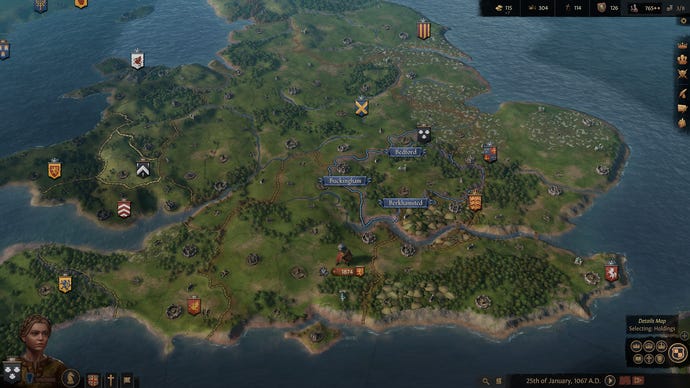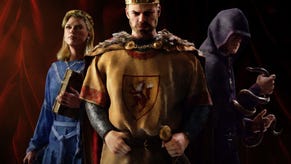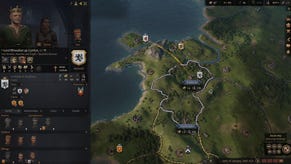Crusader Kings 3: "a reiteration, not a reinvention" of the dynasty-building behemoth
In between getting to grips with Crusader King 2’s seemingly impenetrable systems and going on the occasional crusade, the majority of your time is spent micromanaging your kingdom, marrying off your illegitimate children and other trivial feudalistic matters.
While it was entertaining to build up a haphazard army and unleash them on everyone you’ve not forced to love you through war, bribery or other devious means, it often felt like this process could be much more streamlined, intuitive and - most importantly - fun.
And fun was the buzzword of the day during my time at Paradox Interactive recently, as it revealed Crusader Kings 3 for the first time. It may be due for release some time in 2020, but it's been in production since before work on Imperator: Rome began, so it’s been in the pipeline for some time.
Gone is the unintuitive and clunky menu system from the previous iteration, replaced by a sleek, minimalist UX that fans new and old should appreciate. You won’t need to spend ages hunting around for menus or definitions either; the new Tooltips function lets you read more about keywords, letting you learn at your own pace in a more accessible and player-friendly manner.
Many of Crusader Kings 2’s core RPG mechanics have received a long-awaited overhaul, giving you even more options and playstyles to choose from. It’s a much more efficient system than in any previous iteration, and it’s clear that the development team has had its ears close to the ground in regards to what the community wants.
Game director Henrik Fåhraeus addressed the design overhaul by saying that "user-friendliness was never our primary goal. Now we have a chance to address an even larger audience." Fåhraeus was keen to stress that the aim was to create a new grand strategy experience that is inviting to new players without "dumbing down" and estranging the established community.
In Crusader Kings 3, characters and their dynasty feel more dynamic than ever before. You’ll be greeted with an animated avatar of your leader and their family, similar to how your Sims greet you during the loading screen. When you enter the game, your leader’s avatar will remain animated, reflecting their current state of mind in the bottom right of the screen, which is less intrusive than the ugly character stat screen from its predecessor.
While your chosen leader will have some predetermined traits, you’ll be able to choose from a range of Lifestyles that will shape your character further. Each Lifestyle comes with Perks that you can unlock by completing Schemes related to your traits. As you play, you’ll unlock even more attributes that will aid you in creating the despicable despot or beloved leader of your dreams.
Dynasty building is central in Crusader Kings 3, and a new Dynasty Trait can be earned by completing various tasks and unlocking Perks. This trait represents the reputation of your leader and their family, and can heavily influence what random events will happen in-game. Once unlocked, it cannot be undone and will be present for as long as your Dynasty survives.
Despite what the name might suggest, the Crusader Kings franchise isn’t all about war. The definition of a crusade is a vigorous campaign for political, social, or religious change, which allows you to wage your war on many fronts.
While holy wars are one of the most enjoyable routes to take in Crusader Kings, statecraft is one of the other most popular crusade routes that players undertake. My crusade style is producing as many offspring as I can get away with and marrying them off across the globe, securing alliances and gaining more power as my family and dynasty grows.
In Crusader Kings 3, you can choose Perks that will increase your Renown, allowing you to choose dynasty skills that will increase your Glory and Piety, which are both much sought after traits for marriage. As you improve these traits, you’ll have better success when trying to marry for power, should you wish to produce several offspring and embed your dynasty in kingdoms across the globe. If you’re less interested in war, this crusade-by-proxy will be the easiest way for you to secure power.
Of course, you could always develop your Intrigue and take on a trait that will increase your notoriety as a warlord and someone not to be trusted so easily. Increasing your Intrigue perks will assist you should you wish to go down the path of assassination. By recruiting a high-quality spymaster and keeping your vassals, cadet branches and spouse loyal and happy, you should avoid an untimely death.
The Intrigue system works both ways, however. If a foe isn’t well respected at court, and has an unloyal spymaster or has a spouse that has their own deviant traits, you can recruit one or all to help do your bidding. It will also be much clearer what will or won’t improve your chances of successfully assassinating a rival; there’s no more dealing solely in percentages and a bit of dumb luck. By playing to your characters strengths, you’ll be able to avoid having to constantly bribe everyone to get them onside to get the best outcome and can instead focus on more important things, like building your army.
While you could build an army of fairly impressive size in Crusader Kings 2, it didn’t allow for a lot of choices when it came to unit types. In Crusader Kings 3, you’ll have units that are unique to your leader and you’ll be able to choose a different type of unit for each type of terrain you might face. You’ll also be able to assign leaders and generals, ensuring that you have the best of the best leading your crusades at all time, rather than the random rolls with poorly matched infantry.
There isn’t going to be any Imperator: Rome inspired naval combat, but there’s enough choice and scope in the new army mechanics that will excite veterans and make the combat system more enjoyable all round. If there was ever a time to create a new Heresy and embark on holy war, this is it.
On the surface, Crusader Kings 3 isn’t quite the foreboding beast that Crusader Kings 2 is. With an accessible new design and a sharper focus on RPG elements, you could easily forget that this is one of the most challenging grand strategy franchises around. When I spoke to Max Olbers, the content designer at Paradox, he described Crusader Kings 3 as being “complex, but not complicated” which neatly sums things up. “It’s an iteration, not a reinvention,” said lead designer Alex Oltner, as Paradox has worked tirelessly to produce a familiar yet totally new experience for grand strategy fans new and old.
Statecraft is the crux of a longlasting dynasty, though you’re less likely to make a mistake and suddenly hit the game over screen. If your dynasty falls, you’ll be able to remain in the world you’ve helped create and continue playing as another leader. This gives you an unexpected edge as you’ll have an insight into how certain countries operate. Of course, you could just brush that 30-hour save off as a practice run and start again.
Stress plays a vital part in shaping your leader. If you act in accordance with their traits, they’re less likely to deal with long-term stress. If your choices are inconsistent with your predetermined traits, your leader will become more stressed. The more stressed you become, the longer you will remain stressed and there’s even a chance you’ll become a lunatic, which can impact your dynasty throughout future generations. If like me, you like having an insane leader, this should prove an interesting challenge, though you can’t just go around killing your children or anything like that. You can also try to inflict this hell on your enemies; destroy enough of their army, kill their closest allies or family and take over their lands and you might just drive them to insanity, disposing of that prick in your side.
Crusader Kings 3 incorporates fan-favourite expansions and mechanics from its predecessor, complete with a fresh lick of paint and new features that reinvigorate the role-playing immersion Crusader Kings 2 has always been praised for. Rodrigue Delrue, the community dev at Paradox, highlighted that while there are fewer expansions planned post-launch, you'll still be able to mod the s**t out of it and can look forward to regular dev diaries and gold standard quality of life updates.











